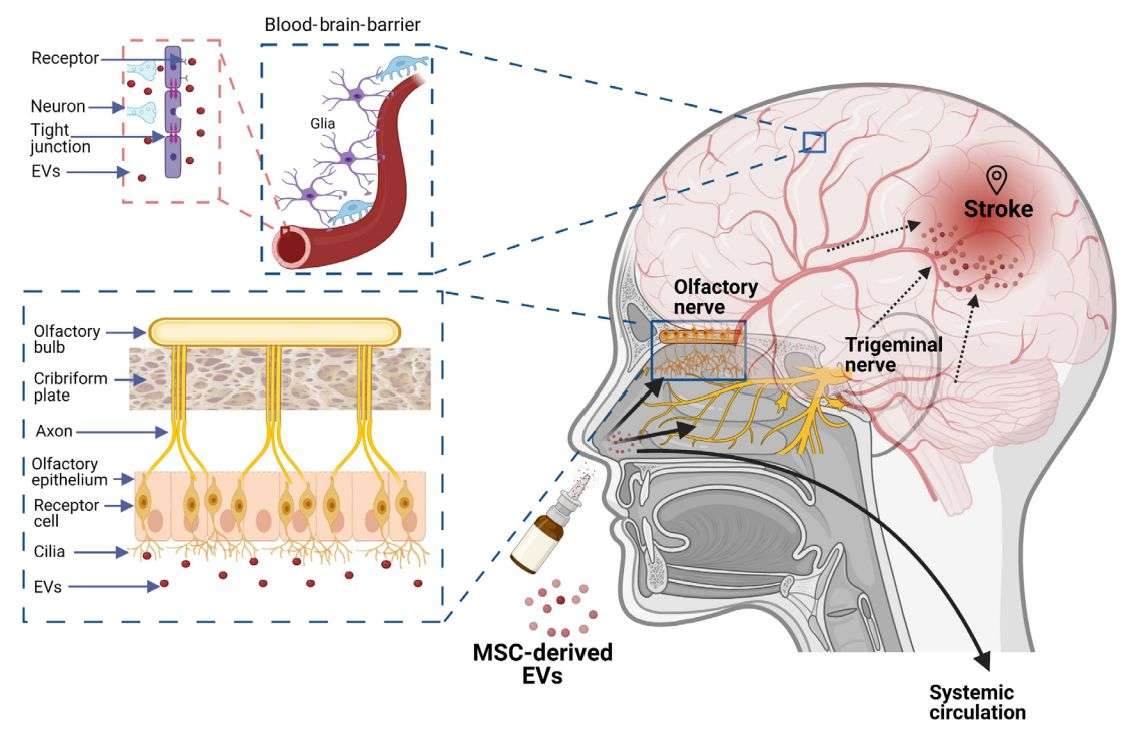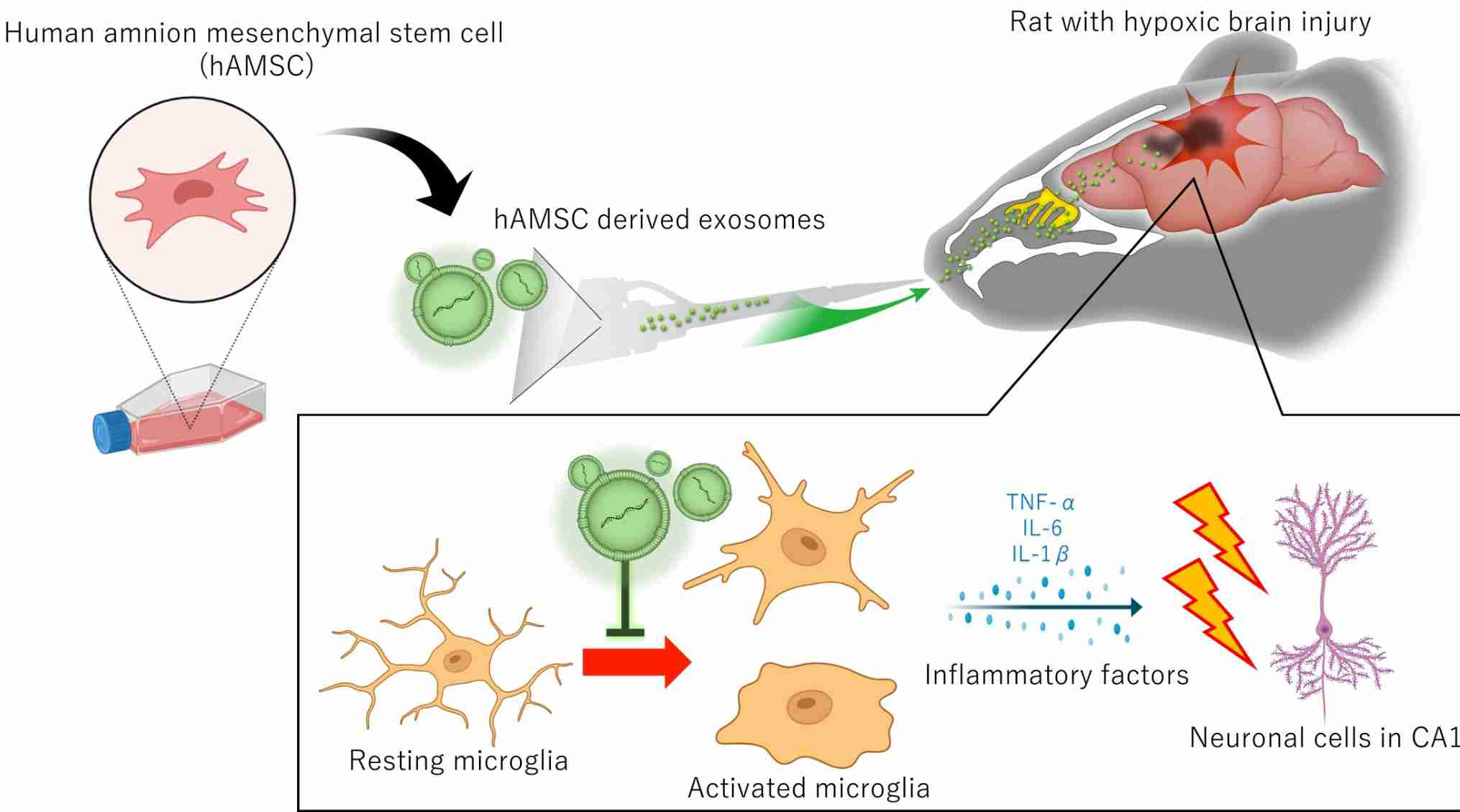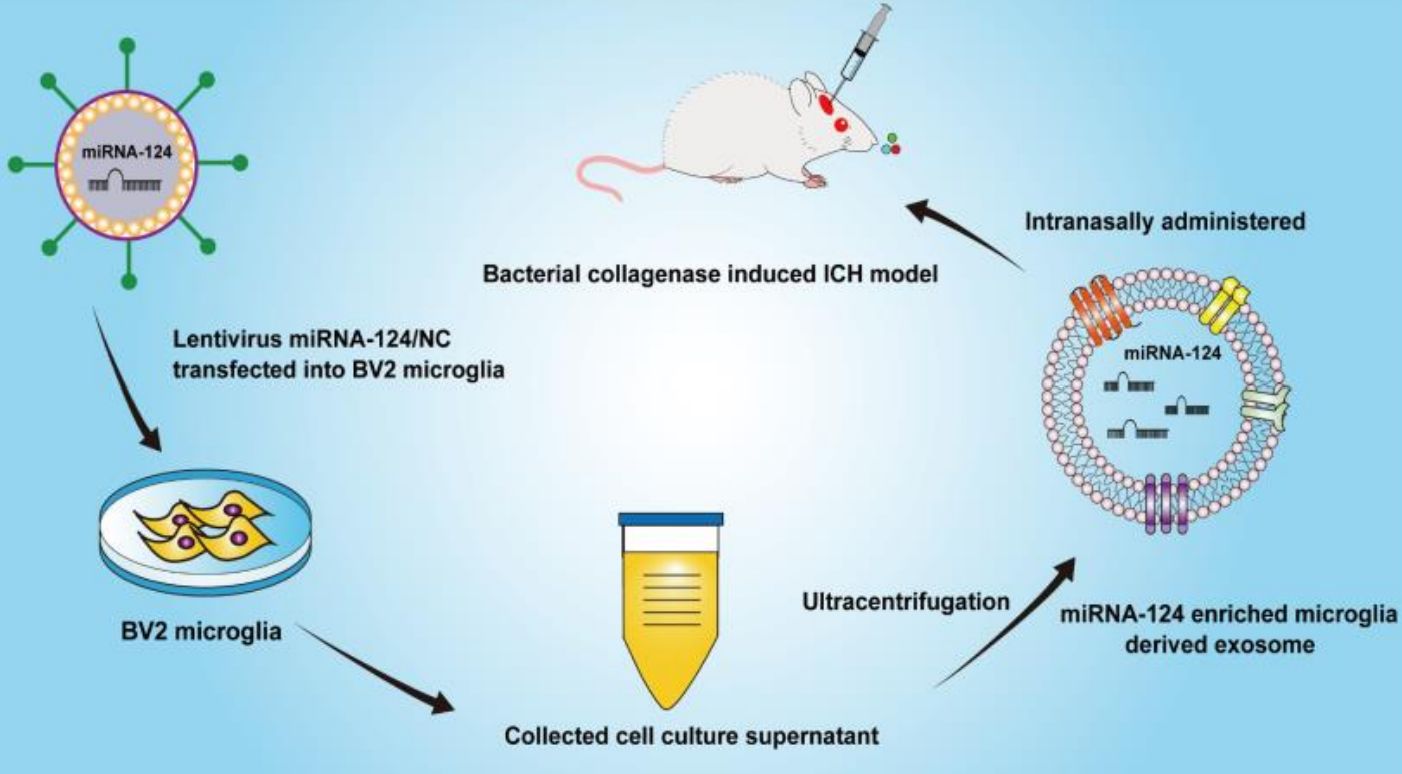Intranasal Administration Exosomes
Nasal administration of exosomes is emerging as a promising alternative to traditional delivery methods for a variety of therapeutic applications. Intranasal administration offers a non-invasive, convenient, and potentially more effective strategy for delivering exosomes to specific target areas, particularly within the central nervous system (CNS).
 Figure 1. Schematic of key aspects of EVs transport through the nose to the CNS. (Herman S, et al., 2021)
Figure 1. Schematic of key aspects of EVs transport through the nose to the CNS. (Herman S, et al., 2021)
Application Fields of Intranasal Administration of Exosomes
The nasal route of drug delivery has shown promise in a wide range of therapeutic areas, including
Neurological Disorders - Intranasal exosomes may cross the blood-brain barrier (BBB), a protective barrier that normally restricts drug delivery to the brain. This makes them ideal for treating neurological disorders such as Alzheimer's disease, Parkinson's disease, stroke, traumatic brain injury, and multiple sclerosis. Exosomes deliver proteins, ASOs, miRNAs, mRNAs, etc., and promote neuronal regeneration.
Infectious Diseases - Through intranasal administration, exosomes carrying antiviral or antimicrobial agents can be targeted directly to the nasal cavity to provide localized treatment for respiratory infections.
Pain Management - Exosomes can deliver analgesics directly to the nasal mucosa, providing a potential alternative to systemic analgesics.
Allergic Rhinitis - Nasal exosomes can modulate the immune response of the nasal mucosa, potentially alleviating the symptoms of allergic rhinitis.
Cases
- Intranasal Administration of Mesenchymal Stem Cell-Derived Exosomes Reduces Hypoxic-Ischemic Brain Injury
There is no effective treatment for hypoxic-ischemic brain injury due to insufficient oxygen supply to the brain. Recent studies have shown that exosomes released from MSCs have therapeutic potential. Given the challenge of systemic dilution with intravenous administration, nasal administration has emerged as a promising approach. The researchers analyzed the effects of nasal administration of exosomes on animal models. The study found that rats treated with exosomes showed significant improvement in cognitive function and had significantly fewer apoptotic cells and higher neuronal cell survival in the hippocampus.
 Figure 2. Intranasal administration of exosome attenuates hypoxic-ischemic brain damage. (Ikeda T, et al., 2024)
Figure 2. Intranasal administration of exosome attenuates hypoxic-ischemic brain damage. (Ikeda T, et al., 2024)
- Transnasal Delivery of Microglia Exosomes Improves Neurologic Outcomes After Cerebral Hemorrhage
Neuroinflammatory response is an important pathological change in cerebral hemorrhage (ICH), exacerbating neuronal cell death. Exosomes are important carriers of intercellular information transfer, characterized by low immunogenicity, strong ability to cross the blood-brain barrier, and easy modification, and are considered a promising therapeutic tool in translational medicine. It has been found that exogenous administration of miRNA-124 overexpressing microglia exosomes (Exo-124) can effectively ameliorate cognitive deficits after injury. Gene-edited exosomes attenuated neurological deficits and brain edema, improved blood-brain barrier integrity, and reduced neuronal cell death. The findings provide a promising therapeutic strategy to ameliorate neuroinflammation in ICH.
 Figure 3. Flow chart for intranasal administration of microglia-derived exosome administration. (Guo M, et al., 2023)
Figure 3. Flow chart for intranasal administration of microglia-derived exosome administration. (Guo M, et al., 2023)
Advantages of Exosome Administration through the Nose
- Non-Invasive - Avoiding injections or invasive procedures makes it more comfortable and convenient for the patient.
- Direct Access to the CNS - Intranasal delivery allows exosomes to bypass the blood-brain barrier and reach the CNS, potentially enhancing their therapeutic effect in neurological disorders.
- Rapid Absorption - The nasal mucosa is richly vascularized, allowing for rapid absorption of exosomes into the bloodstream.
- Targeted Delivery - Intranasal delivery allows for the targeting of specific areas within the nasal cavity, thereby maximizing therapeutic efficacy and minimizing systemic side effects.
Challenges of Exosome Administration Intranasally
Research on intranasal exosome administration is rapidly evolving, with promising preclinical studies demonstrating its safety and efficacy in animal models. However, several challenges remain.
- Maintaining the integrity and stability of exosomes during intranasal administration is critical to their therapeutic efficacy.
- Optimizing the delivery efficiency of exosomes to the target site requires further research and development of suitable formulations and delivery devices.
- Although intranasal administration offers a potential route to bypass the BBB, further studies are needed to understand the mechanisms by which exosomes penetrate the BBB and to enhance their ability to cross this barrier.
- Clinical trials are needed to evaluate the safety and efficacy of intranasal exosome administration in humans.
Today We Offer
Exosome administration intranasally represents a promising new field in therapeutics. It provides a non-invasive and potentially more effective method of delivering these therapeutic agents into targeted areas, particularly within the CNS. With continued research and development, this approach has the potential to revolutionize the treatment of a wide range of diseases.
At the forefront of exosome research and development, Creative Biostructure is focused on providing a comprehensive range of services and products to explore the application of exosome administration intranasally. Our team of experts is dedicated to driving therapeutic innovation by providing cutting-edge technologies for exosome isolation, characterization, and analysis. We help clients fully utilize the potential of exosomes in a range of diseases, particularly in neurology and respiratory health. We are committed to excellence and strive to facilitate breakthrough discoveries that improve patient outcomes and pave the way for novel therapeutic strategies. Feel free to contact us for a formal quote.
References
- Herman S, et al. Intranasal delivery of mesenchymal stem cells-derived extracellular vesicles for the treatment of neurological diseases. Stem Cells. 2021. 39(12): 1589-1600.
- Ikeda T, et al. Intranasal Administration of Mesenchymal Stem Cell-Derived Exosome Alleviates Hypoxic-Ischemic Brain Injury. Pharmaceutics. 2024. 16(4): 446.
- Guo M, et al. Intranasal Delivery of Gene-Edited Microglial Exosomes Improves Neurological Outcomes after Intracerebral Hemorrhage by Regulating Neuroinflammation. Brain Sciences. 2023. 13(4): 639.